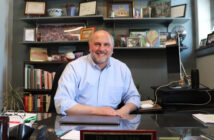Ezra Klein came to Lehigh, virtually, on Feb. 8 to deliver Lehigh’s Kenner Lecture on Cultural Understanding, hosted by the College of Arts and Sciences. Klein’s lecture was titled “What We Can Do About Toxic Polarization.”
Klein is a columnist for the New York Times opinion page. He has a decorated journalism background as founder of Vox, founding The Washington Post’s Wonkblog, and author of “Why We’re Polarized.”
Before the event, The Brown and White spoke with Klein about polarization as well as navigating the political and societal implications that come with it.
Q: What drew you to writing about political polarization?
Ezra Klein: I’ve covered politics now for 19 years, and my specialty is I’m a policy reporter. So, I cover things like a fight to pass the Affordable Care Act, or the financial crisis bailout or the COVID policy response. I’ve noticed the same dynamic in all of them, which is everything I cover, when it starts, there’s a lot of room for what you could call “positive sum bargaining.” There are ways you could make the healthcare system, or the financial regulation system, or pandemic response better, that appealed to thinkers and the apparent principles of both parties. Then, as the bargaining goes on, instead of getting to this positive sum, things become more sharply divided. By the end of the process, they typically are bitter. Something is going on in the way we negotiate our answers in American politics that is beyond the simple question of “is there an answer that we could all deal with?” So, I’m trying in the book (“Why We’re Polarized”) to come up with a model. I’ve been trying in my career to come up with a model of how politics works, that does a better job explaining literally how politics works. If you don’t understand why the problems are happening, (and) keep occurring, then you’re definitely not going to be able to fix them and you’re going to try the wrong things that will make you more frustrated. I was drawn to studying polarization simply because it is the dominant political fact of our time and it drives the outcomes of the things I cover and care about.
Q: If parties can’t unite over something like the pandemic or climate change, which essentially put all of our lives on the line, is it still possible there could be an issue that unites us?
EK: If you’re going to polarize, literally politically polarize, over whether or not to take life saving vaccines, then there’s probably nothing of sufficient danger or immediacy that can really overcome politics anymore. If China invades tomorrow, maybe. But short of something staggering like that, no. We’ve had no end of crises over the past decade and a half, and they all end in us being more divided. They don’t unite us. Maybe there is a little bit more unity right at the beginning, you pass something like TARP, or you pass the Cares Act, but by the end, people are at each other’s throats. The boundaries of political polarization, if you once thought they could be overwhelmed by pressing emergency-level issues that are visible in our daily lives…you’ve been proven wrong.
Q: Given the trend of increasing polarization bringing parties further and further from compromise, is democracy sustainable?
EK: Let’s hope. Probably. It also depends on how you define democracy. I would say it’s sustainable. I’m not sure it’s very stable. This is the kind of gloss I’d put on it. I’m not somebody who thinks we’re headed for civil war. I don’t think it’s likely that we will have a total constitutional crack up in the near future, but I think you have to look around and say this is less stable. We had an insurrection that took over the Capitol, even if only briefly. At the same time, most House Republicans voted against certifying the election results. You can’t look at that and say nothing’s going wrong.
Q: Is being aware of polarization a useful tool to escape it?
EK: On an individual level, I think it can be helpful. But I don’t think it matters that much societally, because something about polarization is it is not experienced as some abstract thing called polarization. It is experienced as “those folks over there are wrong and scary.” And to some degree, part of us literally become more different from each other. If you are pro-choice, the Republican Party has become more threatening to you over the past 20 years. If you are pro-life, the Democratic Party has become more upsetting to you over the past 20 years. The parties really have changed, become more different, become more distinctive in their views for the country and that means, mechanically, that if you agree with one or the other, you’re going to be more unnerved about the folks across the aisle from you. So, I don’t think knowing that there’s a lot of polarization does much for you in that scenario…It’s hard to solve macro problems with micro solutions.
Q: With so many options for news sources, and people gravitating toward the information that affirms their personal views, then resulting in no shared set of facts that are agreed upon between both parties, is journalism part of the solution or part of the problem?
EK: I’m not sure solution or problem is a way I would frame it, because I think implicit in that is the idea that if you write content that its effect is polarizing, you’re part of the polarization problem. But a lot of true things are polarizing. You say, “Donald Trump lied a lot and tried to overturn the election,” is a polarizing statement, but a true one. So I wouldn’t say it’s part of the problem. The problem is that that statement is polarizing. That’s not exactly journalism’s fault. Journalism is part of a system where the incentives even for good thoughtful actors end up making them more polarizing players. And there’s not really an answer, not that I can tell. You can orient your pieces one way or another, but there’s not really a way to escape a system that has become captured by the logic of differentiation.
Q: What is needed to break the cycle of the country becoming more polarized?
EK: I don’t think we know. Absence, something like a foreign threat. You know, we go to war with China over Taiwan, that kind of thing, which foreign threats do seem to have a rally-around-the-flag effect. We don’t have a recipe book for ending or reversing polarization. Part of my book is simply that in fact, this is sort of a polarization flywheel which is pushing this (polarization) forward, accelerating it as time goes on. The media response, it becomes more polarized. Donors response, it becomes more polarized, it’s very hard to interrupt all those.






Comment policy
Comments posted to The Brown and White website are reviewed by a moderator before being approved. Incendiary speech or harassing language, including comments targeted at individuals, may be deemed unacceptable and not published. Spam and other soliciting will also be declined.
The Brown and White also reserves the right to not publish entirely anonymous comments.
1 Comment
Thanks for some detail on Mr. Klein in the Lehigh Kenner Lecture.
Journalism is part of the problem. It is not as simple as printing the truth/reporting. “Donald Trump lied a lot and tried to overturn the election, is a polarizing statement, but a true one.” The problem with that is all of us lie and politicians more than most. When has The Brown and White (B&W) reported the lies of Trumps opponents or reported on something positive the former president has accomplished. If you can’t find any positives you are biased (part of the problem). You are polarized.
I will posit that the glue that held the country together was a belief in the ideals of America coupled with a Judeo-Christian religious focus on community among other aspects.
Now it is, screw the ideals, America was rotten from the start. There is much truth in the rotten America theory but when the ideals are forgotten and sinners not forgiven all hell breaks loose.
The movement towards individualism where “I” is more important than “us” is another polarizing idea. All the “I’s” tend to segregate themselves and create a more uniform but less diverse “us”.
Todays diversity is a fake diversity it is un-natural having been created by law rather than natural progression. Admittedly law was necessary sometime when natural progression was stifled.
It’s also screw the Judeo-Christian ethics (JCE) for much the same reason, it is thought that those in power used JCE to control and abuse people. The abuse was perpetrated by those who claimed that they adhered to JCE. JCE doesn’t abuse people, people abuse people.
Journalism can and should be a part of the solution by providing information useful to people in making decisions or proposing actions. Possibly at a university, information should be provided in the format of a debate or a military staff study so that a wide variety of outcomes can be considered by readers.
Does B&W have a mission statement? Does it have a naturally diverse staff not only a legal one? I believe that B&W reports and writes truthfully as they see it but I don’t think they cover topics equitably all the time. I don’t think it is by design but because of a lack of diversity, possibly through no fault of their own.